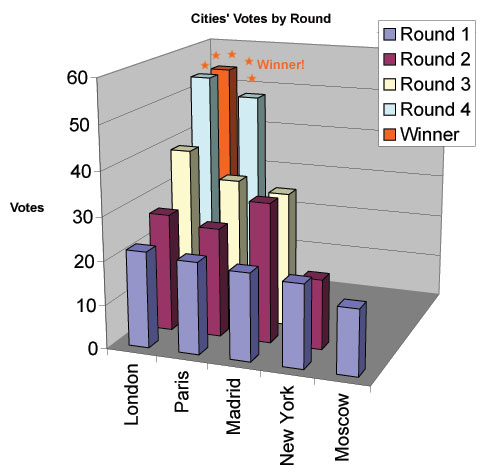On July 6, 2005, the International Olympic Committee selected London to be the host city of the XXX Olympiad in 2012. The runoff system was a key factor in London's success because it did not receive a majority of votes on the first counting. In later rounds the city picked up a number of second and third choices from the eliminated cities of New York, Moscow, and Madrid.
In each round the city receiving the least votes was eliminated, and its votes were redistributed to the other choices. Cities' delegations were not allowed to participate in the voting until their city was eliminated from the ballot.
The International Olympic Committee should join the Academy of Motion Picture Arts and Sciences, the American Political Science Association, and other organizations in using IRV to make democratic decisions. With IRV, voters rank all of their preferences on a single ballot, and auxiliary choices are used to simulate runoffs.

- In the first round of voting, London was leading with only 23% of the vote, followed closely by Paris with 22%. Moscow only received 15 votes and was eliminated.
- In round 2, the 15 votes for Moscow were redistributed and because it was no longer a competitor, Moscow was allowed to cast 3 votes. London gained 5 votes, giving the city 27% of the votes. Madrid gained 12 votes, outdistancing London with 32% of the votes. New York was eliminated after losing 3 votes.
- In round 3, the 16 votes for New York were redistributed and because it was no longer a competitor, New York was allowed to cast 3 votes. London gained 12 votes, Paris gained 8 votes, and Madrid lost 1. As the lowest vote getter, Madrid was eliminated.
- In round 4, London gained 15 votes, crossing the majority threshold. London was declared the winner with 54%.
Chart showing breakdown of votes in each round and percentages ( .pdf 21 kb)
